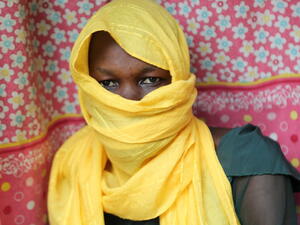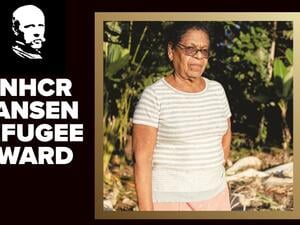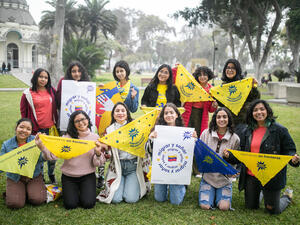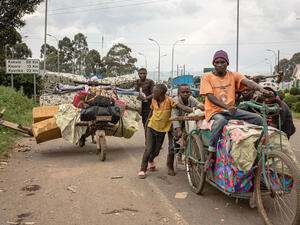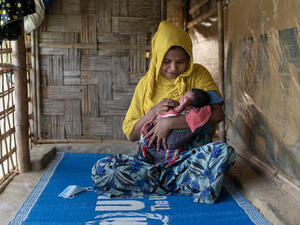UNHCR urges attention on three key gaps in struggle against sexual violence
UNHCR urges attention on three key gaps in struggle against sexual violence

UNHCR Special Envoy Angelina Jolie at the London summit, which she co-hosted. UNHCR chief António Guterres also addressed the meeting, calling for more attention in three key areas to end sexual violence.
LONDON, United Kingdom, June 13 (UNHCR) - UN High Commissioner for Refugees António Guterres has called on the international community to do more to end sexual violence in conflict by paying more attention to the need for a global cultural shift; ending impunity; and providing better support for victims.
Addressing delegates attending a four-day global summit to end sexual violence in conflict, Guterres on Thursday highlighted the progress made over the past six months since a call to action on prevention and response was launched in London last November.
He said good practices included the United States-led initiative, "Safe from the Start;" progress in monitoring sexual and gender-based violence (SGBV) and treatment of victims; new policies; and an increased operational response. However, the High Commissioner stressed the need above all to address what he described as the "three key gaps."
"A male-dominated culture prevails in governments, armed forces, the judiciary, international organizations. It is a barrier to fully understanding the scale and depth of suffering and must be overcome," said Guterres. "This gap is a very serious one and it is not limited to the developing world. We see how difficult it is to deal with family violence in industrialized countries."
The second gap, Guterres warned, was the prevailing culture of impunity for rape and other sexual violence in conflict areas. Perpetrators are rarely arrested, prosecuted and punished. Timely and adequate support for survivors and their families remains the third key gap, he told the "Ending Sexual Violence in Conflict" summit, which is co-hosted by UNHCR Special Envoy Angelina Jolie and British Foreign Minister William Hague.
"The lack of capacity is particularly serious in relation to psycho-social support. The gap is huge and it requires massive investment to be addressed," said the High Commissioner, adding that the summit had been a rare opportunity to confront the world with the dramatic nature of these gaps.
The third day of the London gathering brought together government representatives of 123 countries to hear directly about the nature and impact of sexual violence in conflict; to draw on recommendations from experts; and to provide an opportunity for the governments to discuss national perspectives and challenges as well as outline their own implementation of the UN General Assembly's Declaration to End Sexual Violence in Conflict and any new commitments.
UNHCR Special Envoy Jolie, meanwhile, reminded a packed conference hall at London's Excel Convention Centre why this initiative matters. "We are here for all the forgotten, hidden survivors who have been made to feel ashamed, or been abandoned, and for the children of rape," said Jolie. "We want the whole world to hear their stories, and understand that this injustice cannot be tolerated, and that sorrow and compassion are not enough."
Jolie appealed to the government delegates to move from condemnation to action by changing and improving laws, by including prevention of sexual violence in the training programmes for their armed forces and police, and by supporting and implementing a new international protocol on the documentation and investigation of sexual violence in conflict. She also urged them to fund UN efforts and NGO projects that work with survivors to heal them emotionally and help them to gain support and justice.
On Wednesday, UNHCR's top protection official, Volker Türk, had also spoken about the issue of impunity, stressing the responsibility of states in prosecuting such crimes and the inclusion of survivors in development of measures and policies aimed at preventing and responding to sexual violence.
"We need better monitoring of the global response to protection of women and girls in emergencies and we need to sit down and listen to survivors," Türk, UNHCR's director of international protection, told delegates on the second day of the summit. "Refugee women I met in many emergency situations spoke of sexual violence and offered solutions," he added.
Prevention of and response to SGBV is a core protection responsibility for UNHCR and it is considered to be a life-saving intervention. It is, nevertheless, an under-reported and often hidden form of violence, especially in the context of forced displacement. SGBV represents one of UNHCR's most challenging areas of intervention, a problem that requires coordination and collaboration among a wide range of actors.
"We continue to see the risks of sexual and gender-based violence increase when conflicts and disasters strike," said Türk. As part of the effort to address SGBV from the onset of emergencies, under the Safe from the Start project, UNHCR is supporting the deployment of senior protection officers, dedicated to SGBV prevention and response in emergency operations, to fill immediate gaps in technical expertise. Türk also stressed the need for consistent training on SGBV, which will be made compulsory for UNHCR staff.
By Andrej Mahecic in London, United Kingdom


